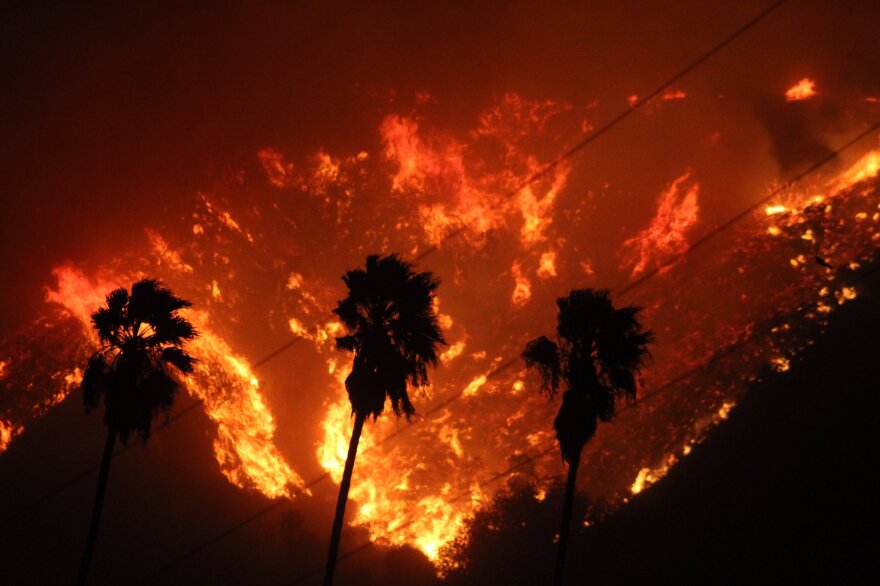As of this morning, the fire in Ventura has scorched 31,000 acres and destroyed 150 structures. We speak to KPCC reporters on the ground for the latest.
Thomas Fire continues to burn through Ventura County
Where there's wind, there's fire in Southern California. And right now, there are three of them.
More than 150 structures have been destroyed and more than 45,000 acres burned in Ventura County. As of late Tuesday morning, at least 27,000 people have been evacuated and 260,000 residents are without power.
The so-called Thomas Fire broke out late Monday in the foothills above Santa Paula and quickly spread west to Ventura, coming within a quarter mile of Ventura City Hall and sweeping through entire neighborhoods in the hills above the city. Other fires have since broken out in Sylmar and Santa Clarita.
Ojai resident and reporter Stephanie O'Neill joined Take Two to talk about the conditions in Ojai, as she stood in front of a house that was on fire in the upper Ojai valley.
"There's no fire engines or firefighters around here because there are so many fires going on in little pockets that they are spread completely thin. The flames are lapping at this house, and the winds are kicking up right now. We've got very, very strong winds," O'Neill said. "Throughout the valley there are different structures on fire. There's plenty burning up here."
To hear the entire report on fire conditions in the upper Ojai valley, click the blue media player.
Budding biz: How one West Hollywood pot shop is preparing for legal cannabis
It's a Nordstrom! No, it's an Apple Store. It's a pot shop?
At first glance, you might think MedMen in West Hollywood, with its glass storefront, ample natural light and generous use of wood, was a department store. And it's not by accident.
Uniformed staff members stand ready to walk customers through the differences between indica and sativa. Gentle music is piped through a storewide sound system, while iPad menus showcase products.

"You should feel like you're shopping at Nordstrom and not at a pot shop," explains Daniel Yi, director of communications for the company.
For seven years, MedMen has tried to change pot's seedy reputation, literally taking it out of the dark, to a glass-window storefront off Santa Monica Boulevard. The company manages four medical marijuana dispensaries in Southern California with plans to open a fifth later this month.
Now they're preparing for the biggest development in the company's history: the legalization of recreational marijuana in California.


MedMen is one of several retailers hoping to sell recreational cannabis when it becomes legal next year. Getting to that point means navigating a complicated application process to get the permits necessary to operate.
"All of the operators in the cannabis industry in California today are gonna need to get two levels of licenses going forward... state-level licenses and municipal-level licenses," Yi says.
Yi says vendors will need to have a municipal license to get a state license. They'll also be subject to taxes.
"It's a long, drawn-out process. We're talking about — digitally — reams and reams of paper. In some cases, hard copy paper... It's a long and arduous process," Yi says.
Waiting at the other end of that process, however, is money — lots of it.
"It's possible — triple, quadruple," Yi says.
Cannabis-curious customers who walk through the doors will discover an array of products derived from pot, ranging from tinctures, ointments and vaporizer pens, to infused kombucha, and sodas.
"When the recreational market opens up, it's gonna be more like going to your Whole Foods section and shopping for wellness products or glucosamine," Yi says.


MedMen plans to abide by state and local laws, but some dispensaries might not be in a hurry to do so. Yi says shops operating in cities where dispensaries are outlawed, as well as those who may choose to not go through the application process to become legal, may still choose to stay in business. That presents a problem for companies like MedMen. Renegade pot shops unencumbered by the extra costs of doing business may create unfair competition.
Yi hopes the regulations out now and those to come are strictly enforced.
"The long-term survival of the legal cannabis industry depends very much on enforcing the laws that are coming down the pipeline," Yi says.
It's hard to predict just what will happen on January 1st. Yi says he expects it to be "messy." But despite the hurdles that stores like MedMen expect to face on the road to legalized pot, Yi says it's an exciting time for companies like his.
"I tell people this, and I don't know if it always sinks in: California, the country's biggest state is about to legalize pot. This is going to have huge repercussions for the country for decades to come," Yi says.
Press the blue play button above to hear the virtual tour.
(This post has been updated.)
Why this LA city could be the next ‘Mecca’ for pot businesses
How climate change could worsen droughts and potentially wildfire
As fire rages in Ventura County, Take Two looks at the effects of climate change on California weather. New research from Lawrence Livermore Laboratory found the state could be hit with more frequent and severe droughts due to melting Arctic ice.
Take Two host A Martinez sits down with Noah Diffenbaugh, professor of earth sciences at Stanford University, to talk about how global warming will impact our already parched state.
"People who pay attention to the weather know when high pressure masses in the Pacific block storms from California," Diffenbaugh says. "The significance of this new publications is that those high pressures ridges will become more persistent."
If the pace of climate change continues on the current trajectory, droughts in California might be longer and more severe, possibly leading to more wildfire.
"The drought has certainly dried out the vegetation on the West Coast that fuels wild fires," Diffenbaugh says.
"This new insight is linking future global warming and precipitation in California," he adds. "If you can imagine the butterfly effect that produces ramifications. This is not a butterfly, this is a hammer, a hammer on the climate system."
Click on the media player above to hear what Californians can do to prepare for the change
As California embraces legal marijuana, many cities and counties say 'no'
Tuesday Reviewsday: Wisin and The Marías
Tuesday Reviewsday is our weekly new music segment, and this week Justino Aguila from Billboard joins A Martinez to talk about the latest releases.
Here are his picks.
Wisin
Album: Victory
Songs: “Move Your Body" and "Escápate Conmigo"
Wisin enjoys working with new urban artists such as Ozuna and Bad Bunny because they bring a new musical perspective to the mix.
“We can all learn something new and we can offer audiences more, and that's a blessing,” Wisin says.
For Wisin, a good song has a catchy sound that's thoughtful and that can take many hours to produce. He looks for a sensual lyrics, too, but nothing to offend women.
Ozuna has a different demographic than Wisin, and that's why the combination of the two of them has appeal on a larger scale that’s being heard around the world.
The key to a song is the rhythm, and the musical production and the song should make people want to get up and dance.
“We want to dance, sweat and forget our problems,” Wisin says.
The song “Escapate Conmigo” has all these things.
The Marías
Album: Superclean, Vol. 1 - EP
Songs: "Déjate Llevar (Let Yourself Go)" and "I Like It"
The band, known for their pop sound with vintage appeal, is from L.A.
The main writing force is María Zargoya, a Puerto Rican/Spaniard who grew up in Georgia but moved to L.A. a few years ago.
She met Josh Conway who is a musician/producer/writer (and son of legendary publishing executive Lionel Conway) at the Kibitz Room inside Canter's Deli on an open mic night.
They spoke and decided it would be a great idea to work together.
They are doing their EP release show at The Echo on December 19th. Word on the streets: there are major labels interested in the band.




